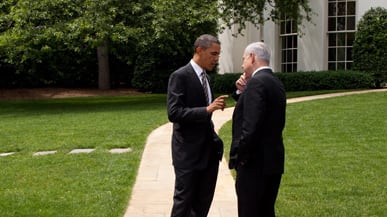I cry for the peoples of the Mideast whose ancient hatreds won't bend to reason or human need. I feel for U.S. presidents forever pressured to cure these centuries-old grudges and shape a new and democratic Mideast, though the region's ailments are rooted in a past accessible only to the haters themselves. Thus, for all his intelligence and fairness, President Obama was not to be envied last week when his latest policy prescriptions were inevitably expectorated by Palestinians as not nearly enough and by Israelis as far too much—and when his ideas for advancing regional democracy were largely ignored by Arab leaders preoccupied by tribal, religious, and power rivalries.

Entwined within this Gordian knot is a truth so terrible as to be rarely spoken. It is that Arabs hate two peoples, not one—the Jews, of course, and also, shockingly, the Palestinians. Yes, the Arabs incessantly demand justice for Palestinians, but the words belie a historical pattern of using Israel as a whipping boy to deflect attention from Arab injustices. Thus, their Arab champions allow Palestinians to fester in refugee camps throughout the region, make no effort to integrate them into their own societies, and provide them with only the most modest economic assistance. Arab leaders and intellectuals say this is necessary to sustain pressure on Israel to take Palestinian refugees back. Yet, they know full well this will never happen. Arabs themselves keep the Palestinians segregated, perhaps because they do not like or trust them, perhaps because they see Palestinians as an inferior tribe or a superior one, perhaps as too demanding, perhaps as too much like the Jews who sprang from the same Abrahamic loins. And Palestinians have often returned these same unkind sentiments in kind, as when they sought to overthrow King Hussein of Jordan in the 1960s and cheered as Saddam Hussein's Iraq troops conquered Kuwait in 1991.
Once again, into this historical abyss came President Obama to speak of new hopes, of how to nurture the Arab Spring or Awakening, of how to think about breaking the Palestinian-Israeli deadlock. Predictably, sadly, and unfairly, his words were greeted in the Mideast, in Europe, and in America itself largely with nitpicking. Many dismissed his speech as being too little too late or nice words without an action program or bad words without an action program. Too bad, because it was a sensible way to think about unfolding events in the Mideast, a pragmatic statement of American interests and values, and a realistic appreciation of what the United States can and cannot do to help the haters emerge from their stultified past.
More so than any of his predecessors, Obama ran open-eyed into the Palestinian-Israeli buzz saw. All who have tried have been cut to pieces by Palestinians insisting that the negotiations had to be about their idea of justice, and the Israelis insisting the issue must be literally their survival. These concepts tend to be absolutes. They repel compromise, or even tolerance of the other side's position. Nonetheless, Obama went to the podium last week and tried again. Most leaders and commentators had warned him that he had to publicly propose a new peace plan lest the Israeli-Palestinian conflict erupt wildly in the streets, and that he had to bond fully with new Mideast democrats lest their hopes be dashed. Ever mindful of previous failures, including his own, Obama dared to do it again—though his courage and fairness produced little applause.
Obama's speech was a sensible way to think about unfolding events in the Mideast, a pragmatic statement of American interests and values, and a realistic appreciation of what the United States can and cannot do to help the haters emerge from their stultified past.
Experts and negotiators will declaim over the bowl full of details in Obama's Thursday speech. But its heart is this: Israel would accept a Palestinian state outlined by 1967 borders with land swaps to accommodate Israeli settlers on the West Bank, while Palestinians would recognize a Jewish state of Israel and agree that its state be demilitarized. In other words, Palestinians would receive statehood, and Israelis would have their security. The equally volatile issues of Jerusalem and the right of Palestinians to return to Israel were to be set aside for later determination. Suffice it to say, the Israeli government went bonkers, and the Palestinians weren't happy either.
In a Friday press conference with Prime Minister Netanyahu and President Obama, the rift exploded into high drama. Obama led off with a judicious, abstract, dry, and precise rendition of his Thursday proposal, leaving out a few unpleasant specifics. Leaning from his chair so that his face neared Obama's, Bibi launched into a telling, persuasive, most eloquent and passionate history of the Jews and of Israel. To him, the negotiations were really about the Babylonians, the Romans, the Christians, the Nazis, and the Muslims trying to exterminate the Jews. Israel was their last chance for survival, and Bibi and Israelis were not about to take any chances with history again. He made a special point of reminding all that while Arabs insist on the right of Palestinians to return to Israel, they never say a word about the rights of more than half a million Jews who were expelled from their ancient homes throughout Arab lands.
Not surprisingly, this matter dwarfed the issue that initially inspired the Obama speech —the Arab Spring. Arabs and others had been criticizing Obama for not expressing sufficient solidarity with the revolutionaries. This time, the rhetoric was unambiguous. Americans were with them in their plunge toward democracy and its freedoms and rights. He urged talks between the Bahrain government, an important U.S. ally, and its unhappy Shia majority, and called for reconciliation in Yemen. He toughened his rhetoric on President Assad of Syria, saying accommodate the reformers or leave.
Not surprisingly, none of this was sufficient for the new Arab democrats. They demanded specifics on how Washington would topple Arab dictators and fund the new democracies. But no American president, not even the democracy-crazed denizens of the George W. Bush team, could or would go much further. Plain and simple, the United States must have oil from the Mideast, and that means staying close to autocratic regimes like Saudi Arabia (about which Obama was silent). Plain and simple, Washington must have allies in the region to help fight terrorists. Plain and simple, Washington still doesn't know, can't know, and has to worry about who would gain or grab power after the autocrats were overthrown.
The occupant of the White House has to think of both the promises and perils in the Arab awakening. Learned policymakers are well aware of the Arabs' Golden Age in the Middle Ages when Europeans were still as apes in trees, and they can wish for some of that shining age to resurface. But American policymakers must also be mindful of power realities and of the difficulties in forging genuine democracies. Obama did well to frame and balance all these delicate considerations.
Nothing will be worthy or lasting in a Palestinian-Israeli accord unless the peace is not illusory. Little will come of the Arab Spring unless their democracies are genuine about the rule of law as well as realistic checks and balances on power. And yet, the devil is not in speech details; it's in overcoming history, ancient and modern.
Leslie H. Gelb, a former New York Times columnist and senior government official, is author of Power Rules: How Common Sense Can Rescue American Foreign Policy (HarperCollins 2009), a book that shows how to think about and use power in the 21st century. He is president emeritus of the Council on Foreign Relations.





